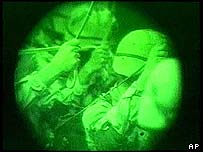
Iran says its military is prepared for a US strike on its nuclear sites
|
US commandos are operating inside Iran selecting sites for future air strikes, says the American investigative reporter Seymour Hersh.
In the New Yorker magazine, Hersh says intelligence officials have revealed that Iran is the Bush administration's "next strategic target".
Hersh says that American special forces have conducted reconnaissance missions inside Iran for six months.
But the White House has described his article as "riddled with inaccuracies".
The authorities in Islamabad have also denied Hersh's charge that the special forces were working with a group of Pakistani scientists who had contact with Iranian colleagues.
"There is no such collaboration," Foreign Ministry spokesman Masood Khan said, adding that the report was "far-fetched" and that Pakistan knew little about the Iranian nuclear programme.
An intelligence official, quoted by Hersh, said Washington had given Islamabad an assurance in exchange for information that it would not have to hand over AQ Khan, the father of the Pakistani nuclear programme who last year admitted to illegally transferring nuclear secrets.
Sniffers
Potential targets include nuclear sites and missile installations, he says.
The New Yorker journalist adds that President Bush has authorised the operations, defining them as military to avoid legal restrictions on CIA covert intelligence activities overseas.
They constitute a revival of a form of covert US military activity used in the 1980s, notably in support of the Nicaraguan Contras.
The task force has been penetrating eastern Iran from Afghanistan and leaving remote detection devices known as sniffers capable of testing for radioactive emissions in the atmosphere, Hersh says.
He reports as well that American special forces units have been authorised to conduct covert operations in as many as 10 nations in the Middle East and South Asia.
Hersh bases his claims on anonymous sources, including former intelligence officials and consultants with links to the Pentagon.
One such consultant is quoted as saying that the civilians in the Pentagon wanted to go into Iran and destroy as much of the military infrastructure as possible.
'Riddled with inaccuracies'
There have also been calls from Pentagon hawks to use a limited attack on Iran to topple the country's religious leadership, one of Hersh's sources said.
The article has already drawn fire from the White House: the communications director, Dan Bartlett, called it "riddled with inaccuracies".
"I don't believe that some of the conclusions he's drawing are based on fact," Mr Bartlett added.
He said the diplomatic approach was still the priority.
"No president, at any juncture in history has ever taken military options off the table," he said. "But what President Bush has shown is that he believes we can emphasize the diplomatic initiatives that are under way right now."
The BBC's Justin Webb in Washington says that while Hersh could be wrong he has a series of scoops to his name, including the details of the Abu Ghraib prison abuse scandal last year.
His track record suggests that he should be taken seriously, our correspondent says.